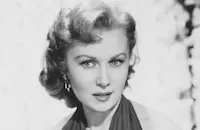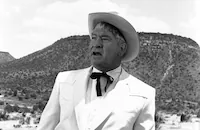Gun Glory

Brief Synopsis
Cast & Crew
Roy Rowland
Stewart Granger
Rhonda Fleming
Chill Wills
Steve Rowland
James Gregory
Film Details
Technical Specs

Synopsis
On the 1880s Wyoming frontier, infamous gambler and gunslinger Tom Early returns to the town in which he left his wife and young boy years before. After Early enters the general store, owner Sam Wainscott, a handicapped man, overcharges him, then jealously berates his clerk Jo for flirting with the known criminal. When Early reaches the family ranch, his 17-year-old son Tom, Jr. shows him his mother's grave and blames him for her death. Early tries to explain that his villainous reputation is unwarranted and that his intentions was to win a fortune for his wife, but the hostile boy refuses to forgive Early for leaving them. The next morning, when Early comes to the store and asks Jo to help him find a housekeeper, Wainscott insinuates that she would consider taking the job in order to have an affair with the criminal. Just then, three strangers tell a gathering crowd that they plan to drive 20,000 cattle through the town's valley on the way to market. Early recognizes ruthless businessman Grimsell among the men and protests that the farmers, as landowners, have the right to refuse access to their valley, but Grimsell claims an Indian treaty has granted him the right to drive his herd through the valley. Despite Grimsell's orders to avoid violence, his cohort Blondie recognizes Early and challenges him to draw. Early tries to refuse the challenge, but Blondie is insistent, forcing Early to kill him. Back in the store, Wainscott taunts Jo, asking her if she prefers a murderer to a "crippled man." Later that night, Jo, frustrated by Wainscott's tirades, rides to the ranch to accept the housekeeping job. When Tom refuses to believe that Early killed Blondie in self-defense, Jo, having witnessed the shooting, assures him that his father acted within the law. The next morning, Early, Jo and Tom ride to church, where the good-natured preacher, an old friend of Early's, warmly greets them; however, when Wainscott rants about Early's lawlessness, the congregation ostracizes them. Days later, after the preacher tells Early about a town meeting that has been called to discuss Grimsell, Early warns him that Grimsell will not settle the dispute legally. Jo, believing the preacher was at the ranch to accuse her of indecency, begs to know what they talked about. Early assures her that her behavior, far from being shameful, has made him happy to be at the ranch again. The next day, Grimsell offers to buy Early's land at an inflated cost to use as a shortcut to the market, but Early refuses. That evening, when young Tom kisses Jo and then apologizes, Jo agrees not to tell Early, knowing the boy acted out of loneliness and confusion. At a town meeting, after it is decided to send townsman Martin to Laramie to obtain land ownership documents to dispute Grimsell's right to drive the herd through their valley, Early warns that Grimsell will use the extra time to gather more gunmen. Later that night, Tom mistakenly assumes Early and Jo are laughing about his amorous attempt and slaps his father. When the temperamental boy refuses to apologize, Early saddles up his horse to leave. Assuming he is leaving for good, Jo rushes out to stop him, but Early assures her he will be back and kisses her. After discovering Martin's dead body in the pass the next morning, Early finds Grimsell and suggests that he take the barren route through public land nearby. Grimsell, who wants to fatten the cattle on the town's lush valley, announces that he now has 30 more gunmen to guarantee his safe passage. When Martin's horse returns to the church without its rider, the preacher gathers a posse and rides out to the ranch to enlist Early in their fight against Grimsell. Finding only Tom, the preacher allows the eager but inexperienced boy to join them. When Early returns to town with Martin's body, he learns that the posse has already left. Gathering red ribbon from the store, he rushes to the pass. The posse is soon cornered in a canyon, where Grimsell's men ambush them. Early arrives to find Tom and the preacher among the wounded. Early bandages his son's injuries then says his farewell to the dying preacher, who asks him to take care of young Tom. After leaving Tom at home with Jo, Early returns to the pass, where he plants dynamite along the cliffs, marking it with ribbon. When Grimsell and his men move the herd through the pass the next morning, Early shoots the dynamite causing it to ignite and send an avalanche of rocks to block the pass. The panicked herd stampede in retreat, killing many of Grimsell's men. Grimsell and his henchman Gunn ride to Early's ranch seeking revenge and take Tom and Jo hostage. As Early approaches the house, Grimsell and Gunn threaten to kill Tom unless Early drops his gun. Early concedes to the demand and walks towards them with his hands up, but then grabs Grimsell's gun. Unarmed and desperate, Gunn then challenges Early to a fistfight. Tom uses Grimsell's weapon to hold Grimsell at gunpoint, while Early and Gunn fight, but when Gunn reaches for Early's gun on the ground, Tom shoots and kills him. After Early orders Grimsell off the property, Tom calls Early "Dad" and admits that violence is sometimes necessary. Heartened by the boy's understanding and his triumph, Early kisses Jo and they promise each other to stay on the ranch.

Director

Roy Rowland
Cast

Stewart Granger

Rhonda Fleming

Chill Wills

Steve Rowland

James Gregory
Jacques Aubuchon
Arch Johnson
William Fawcett
Carl Pitti
Lane Bradford
Rayford Barnes
Ed Mundy
Gene Coogan
Michael Dugan
Jack Montgomery
Bud Osborne
Stuart Towers
Steve Widders
Charles Hebert

May Mcavoy
Crew
Jeff Alexander
Elizabeth C. Clephane
Thomas Edwards
Dave Friedman
A. Arnold Gillespie
Sydney Guilaroff
Charles K. Hagedon
William A. Horning
William Ludwig
Harold J. Marzorati
Dr. Wesley C. Miller
Nicholas Nayfack
Warren Newcombe
Walter Plunkett
Merrill Pye
George Rhein
Ira David Sankey
Frank Santillo
Otto Siegel
William Tuttle
Edwin B. Willis

Film Details
Technical Specs

Articles
Gun Glory
Granger plays a gunslinger who returns home after three years to find his wife dead and his son bitterly turned against him. When a cattleman threatens to run his herds through the peaceful farming valley, the locals ignore Granger's warning that the cattleman will meet any attempts to resist the drive with deadly violence. It then falls to the ex-gunman to save the town, gain back his son's respect and win the heart of a sexy widow.
Granger was not pleased about being assigned to this picture. After several years of top stardom in such high-budget adventure movies as King Solomon's Mines (1950), Scaramouche (1952), and Bhowani Junction (1956), he felt the studio was handing him routine work as punishment for not renewing his contract. Nevertheless, he chose to take on the project rather than spend a year on suspension, and dove into training as a "quick draw" for his first role as a gunman. The broad-shouldered Granger thought he was built all wrong for it, but with the assistance of a Native American trainer named Lightfoot, he soon learned how to "fan" a pistol - at least an empty one. When the time came for the actor to perform the stunt with full-charge blanks loaded into the gun, he flubbed the draw and fired it in the holster, burning the entire side of his leg. Trying to shake the incident off as a joke, Granger attempted a second take. This time he managed to get the gun out, but in the fanning action the sharp striker of the hammer went into his palm. Embarrassed and in a great deal of pain, he required assistance removing the heavy revolver dangling from his palm. On the third take, he performed the stunt impressively. Unfortunately, camera problems required a fourth take; Granger managed to pull off the last attempt without a hitch or injury.
The star didn't fair a whole lot better on horseback. An experienced rider, Granger decided to bring his own horse, Sundown, from his ranch. A well-trained and intelligent animal, Sundown nearly threw Granger when the unfamiliar sound of the camera whirring spooked him. After that, he performed superbly on cue. Granger did admit, however, that he fell off his horse a couple of times during the stampede scene. Although relatively unscathed, he was happy when the shoot was finished and he could hang up his guns. "I thought I'd better stick to sword-fighting in the future," he wrote in his autobiography.
Granger had other complaints about this production, too. He resented what he perceived as a high degree of studio nepotism at work. Producer Nicholas Nayfack, the star said, was only given the assignment because he was the nephew of MGM executive Nicholas Schenck, an old nemesis of Granger's. He also claimed director Roy Rowland was somehow related to Louis B. Mayer (who by this time had been ousted as head of the studio) and carped about having to act opposite Rowland's son, cast as his character's son in Gun Glory. "He'd never appeared in a film before and I don't think he's been seen since," Granger wrote in his autobiography. In fact, Steve Rowland had played small roles in several pictures and TV shows for the five years previous to this and continued acting into the mid-1960s. He also wrote the title song for a teen exploitation film he appeared in - Naked Youth (1960).
One cast member whose credits were unimpeachable was May McAvoy. In pictures since 1917, she had been a leading lady in a number of major silent films, including Ben-Hur (1925) and The Jazz Singer (1927). By this point in her career, in her late 50s, her early work had been largely forgotten, and she received no on-screen credit for Gun Glory.
Also missing a credit here was screenwriter Ben Maddow. A talented writer who had done notable work on The Asphalt Jungle (1950), Maddow was a victim of the Hollywood blacklist. His friend, writer Philip Yordan, "fronted" for him for a few years, taking the screen credit for his work until Maddow's career was rescued from the witch-hunts with credit for the Western The Unforgiven (1960). Yordan was himself a respected and busy writer - Detective Story (1951), Johnny Guitar (1954), an Academy Award for Broken Lance (1954) - who helped out a few people in his profession by putting his name on their screenplays when the blacklist prevented them from working openly.
Director: Roy Rowland
Producer: Nicholas Nayfack
Screenplay: William Ludwig, Philip Yordan (front for Ben Maddow)
Cinematography: Harold J. Marzorati
Editing: Frank Santillo
Art Direction: William A. Horning, Merrill Pye
Original Music: Jeff Alexander
Cast: Stewart Granger (Tom Earley), Rhonda Fleming (Jo), Chill Wills (Preacher), Steve Rowland (Tom Earley, Jr.), James Gregory (Grimsell).
C-89m. Letterboxed.
by Rob Nixon

Gun Glory
Quotes
Trivia
Notes
According to a November 2, 1956 Hollywood Reporter news item, Bob Brandies was considered for a part in the film; however, he was later replaced. Gun Glory marked the first time Roy Rowland directed his son, Steve Rowland, in a motion picture. The film also marked the first time British actor Stewart Granger appeared in a Western. November and December 1956 Hollywood Reporter news items note that portions of the film were shot on location at Bronson Canyon, in Los Angeles and in northern California, with headquarters in Garberville, CA.

Miscellaneous Notes
Released in United States Summer August 1957
CinemaScope
Released in United States Summer August 1957














